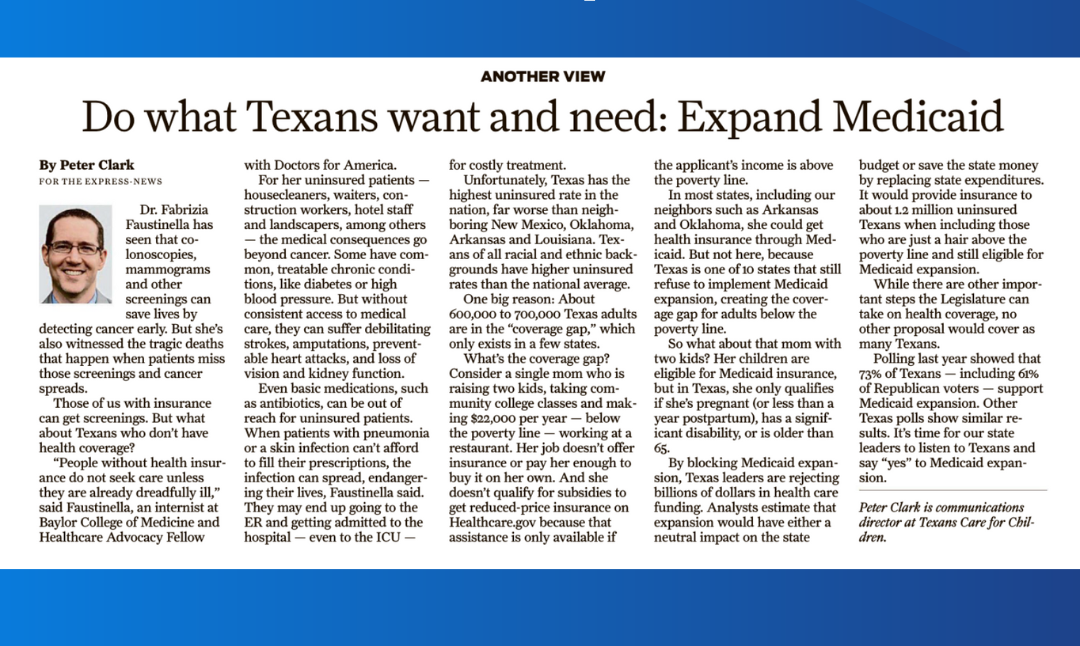
This commentary by Peter Clark, our Communications Director, originally appeared in the San Antonio Express-News on June 26, 2024.
Dr. Fabrizia Faustinella has seen that colonoscopies, mammograms and other screenings can save lives by detecting cancer early. But she’s also witnessed the tragic deaths that happen when patients miss those screenings and cancer spreads.
Those of us with insurance can get screenings. But what about Texans who don’t have health coverage?
“People without health insurance do not seek care unless they are already dreadfully ill,” said Faustinella, an internist at Baylor College of Medicine and Healthcare Advocacy Fellow with Doctors for America.
For her uninsured patients — housecleaners, waiters, construction workers, hotel staff and landscapers, among others — the medical consequences go beyond cancer. Some have common, treatable chronic conditions, like diabetes or high blood pressure. But without consistent access to medical care, they can suffer debilitating strokes, amputations, preventable heart attacks, and loss of vision and kidney function.
Even basic medications, such as antibiotics, can be out of reach for uninsured patients. When patients with pneumonia or a skin infection can’t afford to fill their prescriptions, the infection can spread, endangering their lives, Faustinella said. They may end up going to the ER and getting admitted to the hospital — even to the ICU — for costly treatment.
Unfortunately, Texas has the highest uninsured rate in the nation, far worse than neighboring New Mexico, Oklahoma, Arkansas and Louisiana. Texans of all racial and ethnic backgrounds have higher uninsured rates than the national average.
One big reason: About 600,000 to 700,000 Texas adults are in the “coverage gap,” which only exists in a few states.
What’s the coverage gap? Consider a single mom who is raising two kids, taking community college classes and making $22,000 per year — below the poverty line — working at a restaurant. Her job doesn’t offer insurance or pay her enough to buy it on her own. And she doesn’t qualify for subsidies to get reduced-price insurance on Healthcare.gov because that assistance is only available if the applicant’s income is above the poverty line.
In most states, including our neighbors such as Arkansas and Oklahoma, she could get health insurance through Medicaid. But not here, because Texas is one of 10 states that still refuse to implement Medicaid expansion, creating the coverage gap for adults below the poverty line.
So what about that mom with two kids? Her children are eligible for Medicaid insurance, but in Texas, she only qualifies if she’s pregnant (or less than a year postpartum), has a significant disability, or is older than 65.
By blocking Medicaid expansion, Texas leaders are rejecting billions of dollars in health care funding. Analysts estimate that expansion would have either a neutral impact on the state budget or save the state money by replacing state expenditures. It would provide insurance to about 1.2 million uninsured Texans when including those who are just a hair above the poverty line and still eligible for Medicaid expansion.
While there are other important steps the Legislature can take on health coverage, no other proposal would cover as many Texans.
Polling last year showed that 73% of Texans — including 61% of Republican voters — support Medicaid expansion. Other Texas polls show similar results. It’s time for our state leaders to listen to Texans and say “yes” to Medicaid expansion.
Peter Clark is communications director at Texans Care for Children.



